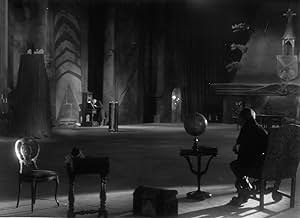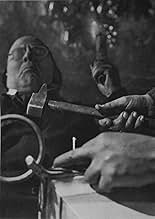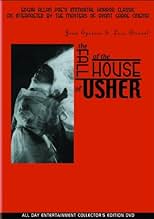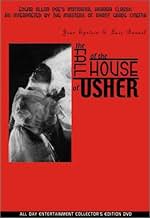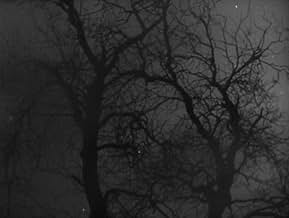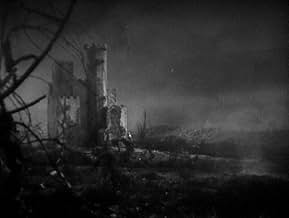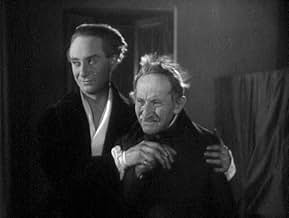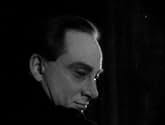CALIFICACIÓN DE IMDb
7.2/10
4.8 k
TU CALIFICACIÓN
Allan visita la siniestra mansión de la familia Usher, donde su amigo Roderick está pintando un retrato de su enfermiza esposa Madeline. El retrato parece estar drenando la vida de Madeline,... Leer todoAllan visita la siniestra mansión de la familia Usher, donde su amigo Roderick está pintando un retrato de su enfermiza esposa Madeline. El retrato parece estar drenando la vida de Madeline, conduciéndola lentamente a la muerte.Allan visita la siniestra mansión de la familia Usher, donde su amigo Roderick está pintando un retrato de su enfermiza esposa Madeline. El retrato parece estar drenando la vida de Madeline, conduciéndola lentamente a la muerte.
- Dirección
- Guionistas
- Elenco
- Dirección
- Guionistas
- Todo el elenco y el equipo
- Producción, taquilla y más en IMDbPro
Opiniones destacadas
This memorable adaptation of Edgar Allan Poe's "The Fall of the House of Usher" is particularly impressive in its use of visuals and in the macabre, disorienting atmosphere that it creates, which fits in well with the story. Jean Epstein made some rather significant changes to the story, but as a movie it all works very well.
The story changes the central relationship between Roderick and Madeline, and in so doing discards some of Poe's themes, but adds some new ones of its own. Likewise there are other differences as the story unfolds, but Epstein had his own consistent conception of the possibilities in the story, so that it's neither better nor worse than Poe's idea, just different - they are both creative and fascinating conceptions in their own way.
The settings and visual effects are very effective in establishing the atmosphere, and in setting off some of the themes of the story. Some of them, such as the enormous array of flickering candles by which Roderick works, are used as recurring images, with surprisingly haunting results. The pace with which the images come at the viewer is also used as part of the effect. It's quite a distinctive accomplishment, and it's a movie that you won't forget for a while.
The story changes the central relationship between Roderick and Madeline, and in so doing discards some of Poe's themes, but adds some new ones of its own. Likewise there are other differences as the story unfolds, but Epstein had his own consistent conception of the possibilities in the story, so that it's neither better nor worse than Poe's idea, just different - they are both creative and fascinating conceptions in their own way.
The settings and visual effects are very effective in establishing the atmosphere, and in setting off some of the themes of the story. Some of them, such as the enormous array of flickering candles by which Roderick works, are used as recurring images, with surprisingly haunting results. The pace with which the images come at the viewer is also used as part of the effect. It's quite a distinctive accomplishment, and it's a movie that you won't forget for a while.
I've read the Poe source for this film more times than I can remember, and Epstein's film captures that story's sense of decay and degeneracy the best by far. Corman's version can't hold a candle to this film; in fact, I feel as if I'm doing a grave disservice to Epstein's work by mentioning Corman's film in the same sentence with it. Let it pass.
Although I'd read about Epstein's USHER for many years and pondered the stills, particularly of the Lady Madeline in her billowing, winding sheet, I was not at all prepared for the terrifying beauty and hypnotic delirium of this motion picture.
It's certainly not for all tastes, and, for those not particularly well-read in outre or occult literature, it will be inscrutable. But for those with an open mind and an appreciation of convulsive beauty, it's hard to find a more exquisite film.
Although I'd read about Epstein's USHER for many years and pondered the stills, particularly of the Lady Madeline in her billowing, winding sheet, I was not at all prepared for the terrifying beauty and hypnotic delirium of this motion picture.
It's certainly not for all tastes, and, for those not particularly well-read in outre or occult literature, it will be inscrutable. But for those with an open mind and an appreciation of convulsive beauty, it's hard to find a more exquisite film.
Predictably morbid and grim, this early cinematic tribute to Poe offers some interesting images and beautifully haunting music. I liked the sequence showing the lace-draped coffin, as it was carried out of that cavernous room.
More stylistic than substantive, the overall effect of the film is to engender a sense of suffocating gloom, rather than to tell an interesting story. It's very much like what one would expect in a nightmare. Space seems strung-out. People are not quite real. Pacing is so slow as to render time suspended between two swings of the clock pendulum.
I don't recall a film that conveyed such an overwhelming sense of introverted bleakness, oppression, and ubiquitous death. Even the trees were dead.
A lot of viewers will find this film lifeless ... so to speak. But for those interested in the antiquity of the occult, or Poe in particular, this film will excite like no other.
More stylistic than substantive, the overall effect of the film is to engender a sense of suffocating gloom, rather than to tell an interesting story. It's very much like what one would expect in a nightmare. Space seems strung-out. People are not quite real. Pacing is so slow as to render time suspended between two swings of the clock pendulum.
I don't recall a film that conveyed such an overwhelming sense of introverted bleakness, oppression, and ubiquitous death. Even the trees were dead.
A lot of viewers will find this film lifeless ... so to speak. But for those interested in the antiquity of the occult, or Poe in particular, this film will excite like no other.
I had always wanted to check out this Silent version of the Edgar Allan Poe horror perennial, and not just because of Luis Bunuel's involvement; actually, he only served as Second Assistant in charge of interiors on the film – so much for the co-directing credit that is often attributed to him (including the DVD front cover). Ironically, when the disc was released by All Day Entertainment, I recall complaining about its "Collector's Edition" moniker when it was a bare-bones affair apart from an essay by the director himself – the company's President David Kalat, however, was prompt to inform me that the proposed Bunuel-related supplements fell through at the last minute.
Anyway, this is now my third viewing of the movie: the second had occurred either as part of an earlier Bunuel retrospective or to compare it with one of the many other filmic renditions of the tale. For the record, a viewing of the obscure low-budgeted 1949 British effort followed this re-acquaintance with the Epstein film, while I also own and have watched the U.S. short (also from 1928) and the 1960 Roger Corman/Vincent Price classic but there are at least five more versions I would be interested in catching (by such notable directors as Alexandre Astruc, Jan Svankmajer, Jesus Franco, Curtis Harrington and Ken Russell)!
That said, my reaction to the film under review continues to be ambivalent: to begin with, this is perhaps one of only two cases which can truly be described as a dream-like experience (the other being the equally haunting but more readily satisfying VAMPYR [1932] by one of my favorite auteurs, Carl Theodor Dreyer); however, the sluggish pacing makes its brief 66 minutes feel long not helped by the archaic parts of the accompanying score (at least, some of it was suitably avant-gardist) and the droning narration, reading the English translation of the original French intertitles, by respected but heavily-accented actor Jean-Pierre Aumont!
Visually, the film really cannot be faulted as the Impressionist first half (with images that could almost be taken for paintings) giving way unsurprisingly to Expressionism in the much-anticipated high-strung finale. Even more than in MAUPRAT (1926), Epstein virtually lets the camera and the editing tell the story: the acting actually leaves much to be desired (especially since both Usher and his guest are way overage, with the latter bafflingly also made out to be quite deaf!); as for Madeleine, she is played by Marguerite Gance (wife of famous pioneer film-maker Abel – Bunuel's disdain of whom eventually cost him his job!), who manages the character's essential frailty and subsequent wraith-like features. Incidentally, Roderick and Madeleine are here husband and wife rather than brother and sister; other unwarranted changes to the source material were its depiction of the Usher mansion as something of a monstrous abode, akin to Castle Dracula, and the rather disappointing climax in which the Ushers actually survive the ordeal – thus rendering the title pointless!
Again, the power (and reputation) of the film rests squarely on its memorable detail: taking a cue from Poe's "The Oval Portrait", Madeleine's 'painting' by Roderick literally comes to life as its subject fades away more and more (at one point, Madeleine even feels her husband's brush stroke on the canvas, as if it had really touched her cheek); her eventual succumbing to catalepsy, played out in slow-motion; the lengthy ritual of her burial (her resting-place even lying across the river, a la Bunuel's own much-later THE RIVER AND DEATH [1955]); her 'resurrection' (amusingly, the name Ligeia also crops up as an ancestor in the Usher family crypt!), with the sight of the casket moving about in the grave anticipating the surreal coffin-scurrying-through-the-wilderness sequence from the Spanish maestro's SIMON OF THE DESERT (1965), etc.
Despite the rather grainy DVD transfer (the faults of the print exposed all the more on my 40" TV monitor), the quality of the cinematography comes though – highlighting both the desolate, fog-bound landscape and the expansive interiors (the wind blowing through the house results in constantly billowing curtains and books falling from the library shelves in slow-motion); as already mentioned, Epstein practically runs the gamut of the cinematic language along the way, adopting such techniques as cross-cutting (at various points during one particular sequence incorporating, for no very good reason, a couple of frogs engaged in the act of copulation!) and superimposition, down to shaking the camera in order to evoke a character's disorientation. Unfortunately, the all-important closing moments of the film are rushed and decidedly muddled – even diminishing a nice effect ostensibly created by a constellation of stars, which appears in the skies behind the mansion, shaped like the Ushers' warped family-tree!
While highly acclaimed in some quarters - with hyberbolic claims ranging from "the finest horror film ever made" to "the pinnacle of artistic achievement in European cinema of the 1920s" - this version would be all but forgotten forty years later (it does not even earn a mention in Carlos Clarens' influential tome "An Illustrated History Of The Horror Film") and the exact same destiny befell Epstein himself later on, despite having been one of the three key avant-garde French exponents of the era (the others were the afore-mentioned Abel Gance and Marcel L'Herbier).
Anyway, this is now my third viewing of the movie: the second had occurred either as part of an earlier Bunuel retrospective or to compare it with one of the many other filmic renditions of the tale. For the record, a viewing of the obscure low-budgeted 1949 British effort followed this re-acquaintance with the Epstein film, while I also own and have watched the U.S. short (also from 1928) and the 1960 Roger Corman/Vincent Price classic but there are at least five more versions I would be interested in catching (by such notable directors as Alexandre Astruc, Jan Svankmajer, Jesus Franco, Curtis Harrington and Ken Russell)!
That said, my reaction to the film under review continues to be ambivalent: to begin with, this is perhaps one of only two cases which can truly be described as a dream-like experience (the other being the equally haunting but more readily satisfying VAMPYR [1932] by one of my favorite auteurs, Carl Theodor Dreyer); however, the sluggish pacing makes its brief 66 minutes feel long not helped by the archaic parts of the accompanying score (at least, some of it was suitably avant-gardist) and the droning narration, reading the English translation of the original French intertitles, by respected but heavily-accented actor Jean-Pierre Aumont!
Visually, the film really cannot be faulted as the Impressionist first half (with images that could almost be taken for paintings) giving way unsurprisingly to Expressionism in the much-anticipated high-strung finale. Even more than in MAUPRAT (1926), Epstein virtually lets the camera and the editing tell the story: the acting actually leaves much to be desired (especially since both Usher and his guest are way overage, with the latter bafflingly also made out to be quite deaf!); as for Madeleine, she is played by Marguerite Gance (wife of famous pioneer film-maker Abel – Bunuel's disdain of whom eventually cost him his job!), who manages the character's essential frailty and subsequent wraith-like features. Incidentally, Roderick and Madeleine are here husband and wife rather than brother and sister; other unwarranted changes to the source material were its depiction of the Usher mansion as something of a monstrous abode, akin to Castle Dracula, and the rather disappointing climax in which the Ushers actually survive the ordeal – thus rendering the title pointless!
Again, the power (and reputation) of the film rests squarely on its memorable detail: taking a cue from Poe's "The Oval Portrait", Madeleine's 'painting' by Roderick literally comes to life as its subject fades away more and more (at one point, Madeleine even feels her husband's brush stroke on the canvas, as if it had really touched her cheek); her eventual succumbing to catalepsy, played out in slow-motion; the lengthy ritual of her burial (her resting-place even lying across the river, a la Bunuel's own much-later THE RIVER AND DEATH [1955]); her 'resurrection' (amusingly, the name Ligeia also crops up as an ancestor in the Usher family crypt!), with the sight of the casket moving about in the grave anticipating the surreal coffin-scurrying-through-the-wilderness sequence from the Spanish maestro's SIMON OF THE DESERT (1965), etc.
Despite the rather grainy DVD transfer (the faults of the print exposed all the more on my 40" TV monitor), the quality of the cinematography comes though – highlighting both the desolate, fog-bound landscape and the expansive interiors (the wind blowing through the house results in constantly billowing curtains and books falling from the library shelves in slow-motion); as already mentioned, Epstein practically runs the gamut of the cinematic language along the way, adopting such techniques as cross-cutting (at various points during one particular sequence incorporating, for no very good reason, a couple of frogs engaged in the act of copulation!) and superimposition, down to shaking the camera in order to evoke a character's disorientation. Unfortunately, the all-important closing moments of the film are rushed and decidedly muddled – even diminishing a nice effect ostensibly created by a constellation of stars, which appears in the skies behind the mansion, shaped like the Ushers' warped family-tree!
While highly acclaimed in some quarters - with hyberbolic claims ranging from "the finest horror film ever made" to "the pinnacle of artistic achievement in European cinema of the 1920s" - this version would be all but forgotten forty years later (it does not even earn a mention in Carlos Clarens' influential tome "An Illustrated History Of The Horror Film") and the exact same destiny befell Epstein himself later on, despite having been one of the three key avant-garde French exponents of the era (the others were the afore-mentioned Abel Gance and Marcel L'Herbier).
A stranger called Allan (Charles Lamy) goes to an inn and requests transportation to the House of Usher. The locals remain reluctant, but he gets a coach to transport him to the place. He is the sole friend of Roderick Usher (Jean Debucourt), who leaves in the eerie house with his sick wife Madeleine Usher (Marguerite Gance) and her doctor (Fournez-Goffard). Madeleine is the beloved muse and model and is being painted by Roderick. When she dies, Roderick does not accept her death, and in a dark night, Madeleine returns.
For those like me that have not read the story of Edgar Allan Poe, the conclusion of "La Chute de la Maison Usher" is quite confused. However, the Gothic cinematography is very impressive, recalling the German Expressionism. It is amazing how Jean Epstein was able to produce such atmosphere, considering the primitive technology of 1928, with difficulties in lighting, sensibility of films, edition table and portability of cameras. However, the shadows and lights are really amazing in this black and white film. This movie was the first work of Luis Buñuel in the cinema industry, working as assistant of Jean Epstein. Just as a curiosity, the resemblance of Charles Lamy with Carlos Alberto Parreira, the coach of the Brazilian soccer team, is incredible. My vote is nine.
Title (Brazil): "A Queda da Casa de Usher" ("The Fall of the House of Usher")
For those like me that have not read the story of Edgar Allan Poe, the conclusion of "La Chute de la Maison Usher" is quite confused. However, the Gothic cinematography is very impressive, recalling the German Expressionism. It is amazing how Jean Epstein was able to produce such atmosphere, considering the primitive technology of 1928, with difficulties in lighting, sensibility of films, edition table and portability of cameras. However, the shadows and lights are really amazing in this black and white film. This movie was the first work of Luis Buñuel in the cinema industry, working as assistant of Jean Epstein. Just as a curiosity, the resemblance of Charles Lamy with Carlos Alberto Parreira, the coach of the Brazilian soccer team, is incredible. My vote is nine.
Title (Brazil): "A Queda da Casa de Usher" ("The Fall of the House of Usher")
¿Sabías que…?
- TriviaLuis Buñuel, who was Assistant Director, quit the picture after clashing with producer/director Jean Epstein over Epstein's decision to basically ignore Edgar Allan Poe's story.
- ConexionesEdited into Histoire(s) du cinéma: Une vague nouvelle (1999)
Selecciones populares
Inicia sesión para calificar y agrega a la lista de videos para obtener recomendaciones personalizadas
- How long is The Fall of the House of Usher?Con tecnología de Alexa
Detalles
- Tiempo de ejecución1 hora 12 minutos
- Color
- Mezcla de sonido
- Relación de aspecto
- 1.33 : 1
Contribuir a esta página
Sugiere una edición o agrega el contenido que falta

Principales brechas de datos
What is the German language plot outline for La chute de la maison Usher (1928)?
Responda
